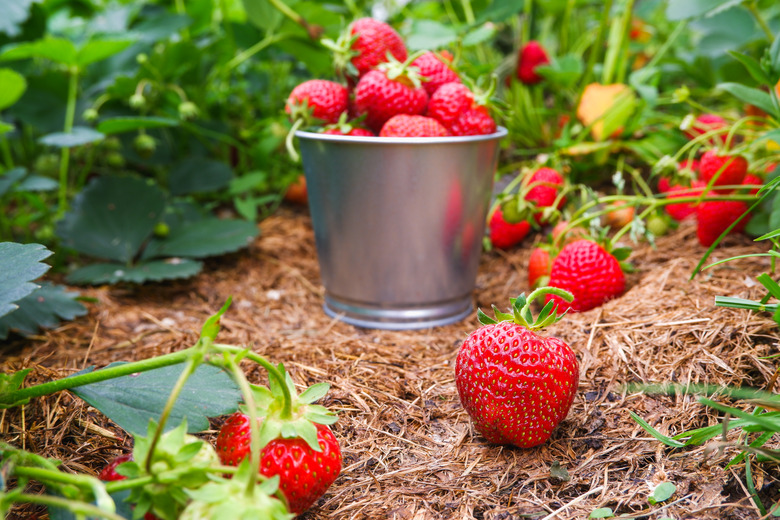Organic Ways To Keep Ants Out Of Strawberry Plants
We may receive a commission on purchases made from links.
Growing your own fruits and vegetables can be a very rewarding hobby, but there is one problem: It seems Mother Nature expects you to share. Tending a garden often means chasing away unwanted pests that may dine on the fruits of your labor before you get the chance. One very common garden issue is ants on strawberry plants (Fragaria spp.). It's important to stick with organic ant control methods when you can so as not to contaminate these thin-skinned fruits.
Ants or Slugs?
Ants or Slugs?
Ants love the sweetness of strawberries, but they are opportunistic pests. Ants usually can't penetrate the skin of strawberries on their own. Instead, they access the fruits after slugs or other pests have already damaged them. If you see both ants and damage, getting rid of the ants may be as simple as getting rid of the slugs that are helping them.
One easy and safe way to do so is to bury an empty tuna can filled with beer next to the strawberry plants. Bury it only deep enough that the top of the can is level with the top of the soil. Attracted to the beer, slugs will slide into the tuna cans and drown. Getting rid of the slugs is sometimes enough to deter ants.
Smear on Some Vaseline
Smear on Some Vaseline
A simple way to keep ants at bay is to coat the bottom of your strawberry plants with petroleum jelly. Ants struggle to walk through it and get stuck, preventing them from reaching the strawberries. If you prefer, you can also use the product known as Tangle-Trap. Like petroleum jelly, Tangle-Trap makes the ants sticky and holds them in place.
When using either of these methods, it's important to make sure your plants stand nice and tall. If any part of the plant other than the stem touches the ground, the ants can use it as a bridge and avoid your petroleum jelly trap.
Sprinkle Diatomaceous Earth
Sprinkle Diatomaceous Earth
If your strawberry plants are hosting ants, another effective way to discourage them is through diatomaceous earth. Made from tiny fossils, diatomaceous earth has rough surfaces that cut up the ants as they walk over it, and then it sticks to them, eventually killing them through dehydration.
Now is a good time to remember that the word "organic" is not synonymous with "safe." Diatomaceous earth is organic and safe to use around food. You should avoid inhaling it, however, as it can cause irritation. It's best to keep children and pets away from diatomaceous earth so they don't kick it up and breathe it in.
Build an Organic Bait Station
Build an Organic Bait Station
There are many ways to get rid of the ants you see on your strawberry plants, but those little buggers are coming from somewhere. Because ants live in such large colonies, the best ant control strategies are those that kill the ants you see and the ants you can't. A bait station is an excellent way to do that. The ants will find the poisoned food and take it back to their colony to share with others, hopefully wiping out your ant problem at the source.
To make an organic bait, mix equal parts of borax and a sweet food, like honey or jelly, in a shallow dish. Place the dish near your strawberry plants where you see the ants. Again, although borax is organic and considered one of the least toxic pesticides, it's not inert. Ingesting large quantities can prove lethal, so keep children and pets away from your ant baits. A simple way to do so is to pour your ant bait into a bottle with a narrow opening that ants can get into but pets and children can't.
Try Companion Planting
Try Companion Planting
This method is a little iffy. Supposedly, certain scents repel ants. The theory goes that because of this, planting varieties ants don't like near your strawberries will keep ants at bay. Mint (Mentha spp.), anise (Pimpinella anisum), and red pepper plants (Capsicum annuum) are all rumored to have this repellent effect. Although there isn't much science to back these claims, some gardeners swear by them, claiming that any strong-scented herb will do the trick. It's certainly worth a try but don't expect miracles from this method.
